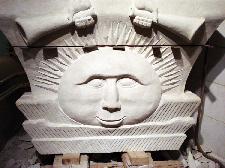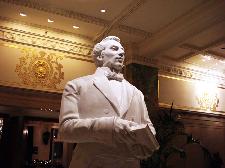“Church History is Threatening my Testimony”
by -Background
 |
The Church is not a historical society. Its mission is to bring people to Christ; to this end, it draws upon its rich history in search of stories that build faith. Contrary to anti-Mormon claims, the Church does not hide its history; search lds.org, and you’ll find that references to “controversial” historical facts are occasionally made. Nevertheless, because these facts are not useful in helping the Church advance its mission of bringing its members to Christ, the Church usually and understandably focuses on faith-promoting stories instead.
This should come as no surprise. Catholic priests don’t preach much about the inquisition. Protestant pastors don’t mention Martin Luther’s anti-Semitism and acceptance of polygamy. Nor should we expect these churches to constantly comment on less-than-inspiring historical facts. Like the LDS Church, these branches of the Christian tree are in the business of bringing people to Christ. Anything that does not serve that purpose belongs to the historians.
Many who are interested in history choose to study the Church beyond that which is necessarily faith promoting. Some foolishly turn to biased and misleading anti-Mormon literature. Others wisely turn to respected academians in the field of Mormon studies, historians like Richard Bushman and Terryl Givens.
Upon realizing that Mormon history is richer than previously imagined, most Mormons react in one of two ways. Some say, “I can’t believe I never heard this in Church. This stuff is awesome!” It’s no coincidence that most of the prominent scholars of Mormon history, scholars like Bushman, Givens, Leonard, Turley, and Walker, are faithful members of the Church. They’ve come to love the history, both the inspiring and the idiosyncratic.
Many, however, are troubled by Mormon history. Endless faith-promoting accounts have led some to have an ill-founded faith in prophets as perfect men. I say ill founded because such faith is not rooted in true principles. Prophets and apostles are indeed inspired men who receive God’s message and transmit it to His children, but the Church has never taught that the prophets are infallible. God alone is infallible.
Is everything a prophet says inspired by God?
 |
Joseph Smith once said, “A prophet is only a prophet when acting as such.” Even when acting as such, however, a prophet is not infallible. Prophets are not God’s puppets; they don’t simply parrot words that God whispers in their ears. They receive God’s message through their hearts and minds, but they interpret that message through the lens of their own understanding and culture. Historically, I’m confident that God has merely permitted some Church policies without necessarily commanding or endorsing them. Perhaps I’ll say the same 50 years from now about some current policies, in light of further truth that may be received through ongoing revelation.
On one occasion, Brigham Young taught that Church members should not assume that everything a prophet says is automatically correct or inspired of God. “I am more afraid that this people have so much confidence in their leaders that they will not inquire for themselves of God whether they are led by Him. I am fearful they settle down in a state of blind self-security, trusting their eternal destiny in the hands of their leaders with a reckless confidence that in itself would thwart the purposes of God in their salvation, and weaken that influence they could give to their leaders, did they know for themselves, by the revelations of Jesus, that they are led in the right way. Let every man and woman know, by the whispering of the Spirit of God to themselves, whether their leaders are walking in the path the Lord dictates, or not.” (Journal of Discourses, 9:150)
Church history shakes me. How can I stay firm in the gospel?
If you believe in a gospel that teaches that prophets and apostles are infallible, your faith cannot and should not survive a careful study of Church history. Fortunately, such a gospel is not the restored gospel of Jesus Christ.
Early Church leaders like Joseph Smith and Brigham Young were great men of God. I know that they were called by God to serve as His prophets. It’s important to remember, however, that Joseph and Brigham’s day-to-day lives in the backcountry of early 19th-century America bore greater resemblance to the lives of those living in the Bronze Age that to our own modern lifestyles. These were noble and inspiring men, but they were primitive men living in a primitive civilization where magic was esteemed like science, the virgin land was thought to contain vast hidden treasures, and human life was often crushed in the merciless hands of diseases long since conquered. God always works with what He has at hand. I can’t help but imagine that our Heavenly Father chuckled as He guided His boy prophet, given Joseph’s primitive behavior and superstitions. (Frankly, He’s probably chuckling at us still ) Nevertheless, through this flawed-but-inspiring prophet, God has established His great work.
Perhaps you, like me, have received a witness in your heart that God has restored His ancient church in modern days through prophets and apostles. With this important foundation in place, a more thorough study of Church history can be faith promoting. Joseph Smith was a poor farm boy from the American backcountry, but God used him as an instrument to advance His designs. Brigham Young subscribed to some erroneous ideas commonly held by other members of his 19th-century civilization, yet he was God’s instrument too. Why can’t God use us, with our imperfections? Ironically, when viewed through this lens, the idiosyncrasies of Mormon history can be just as inspiring as the stories told in Sunday school.
2 Responses to ““Church History is Threatening my Testimony””